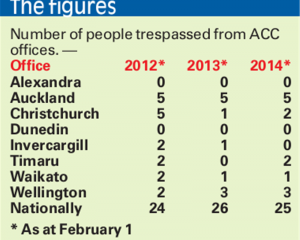The Accident Compensation Corporation intends to cut at least 1150 more clients from its long-term claimants list by the middle of next year.
The company's Statement of Corporate Intent for 2010 to 2013, a copy of which has been obtained by the Otago Daily Times, reveals that those targeted include claimants receiving weekly compensation payments for a year, including "new" long-term claimants.
The latest projected cuts come on top of a big reduction - from 15,271 to about 12,500 - in long-term claimants during the 2009-10 financial year, and after recent controversy and criticism over the ACC's handling of claims involving sexual abuse.
ACC spokesman Laurie Edwards said that the "big picture" should be remembered over the reduction target, which should not be seen as a mainly economic issue.
"It's a measure of how well we're doing in getting people back to their pre-injury lives," he said.
Individual circumstances were taken into account, and if claimants were unhappy with outcomes, they could use appeal mechanisms.
Denise Powell, president of Acclaim Otago, an ACC claimant support group, is worried about what she sees as the high human cost of further substantial cuts in long-term claimants.
Ms Powell told the ODT she was concerned about the effect on the mental health of claimants, of further attempts to remove them from weekly compensation support.
"From talking to people, they're just worn out from having to battle [to retain compensation]," she said.
An earlier survey had shown some Acclaim group members had been badly depressed because of previous moves to "exit" them from ACC coverage, despite their serious injuries.
Ms Powell is also a member of ACC's Consumers' Outlook Group (COG), a national liaison group involving claimants and ACC senior management, and she plans to raise her concerns at the next COG meeting in Wellington on Friday.
A recent "fiasco" over handling of sexual abuse claims highlighted the need for ACC to avoid excessive cost-cutting and using simplistic criteria that did not take individual circumstances sufficiently into account.
Several of ACC's recent moves over work-related rehabilitation had been positive, including an emphasis on good early rehabilitation, through the Better at Work scheme.
But, in the light of a critical independent review panel report on sensitive claims issues, released recently, ACC needed to take a "long hard look" at any future plans for further streamlining processes, such as in the rehabilitation area, to achieve spending cuts, she said.





